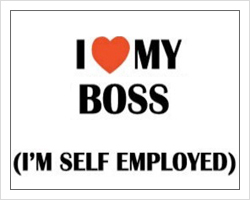How to Get a Loan When You are Self-Employed

The unreliable income of the self-employed (whether that unreliability is actual or perceived) can make it difficult to get a loan because underwriters perceive you as a greater risk than someone with a steady salary. But you don’t have to face automatic rejection; instead, consider the following to maximize your chances of securing a loan:
What type of loan are you trying to get?
The requirements for personal loans, such as a mortgage or car loan, will be different from the requirements for a business loan, such as one taken out to purchase a franchise or inventory.
Keep in mind that underwriters for a personal loan will be focused on your net income, based primarily on your tax returns. On the other hand, underwriters for a business loan will be focused on the financial state of your business.
Minimizing Taxes vs. Maximizing Net Income
If you are looking to take out a personal loan, like a mortgage, the bank will be most interested in your income history to determine your ability to repay the mortgage. Most mortgage applicants simply have to provide their W-2 forms for the last couple of years. However, if you’re self-employed, the bank will want to review your income tax returns, and will zero in on one number: your net income.
Your net income is the number arrived at when you deduct expenses from your gross income. Most taxpayers seek to maximize deductions, which minimizes their taxable income. But for self-employed loan applicants, that smaller number may reduce the amount of the loan you are qualified for. You may want to consider whether it is worth foregoing some tax deductions and paying more taxes in order to make it easier to secure a loan.
You’ll need to document your financial history.
For personal loans like a mortgage, be prepared to authorize the lender to obtain your tax returns from the IRS. You may also need to provide bank statements and documents that verify your business, such as your business license and accounting records. The lender will likely look at the average of your last two years of income to determine your income for underwriting purposes. Thus, if you made $70,000 two years ago and $100,000 last year, the lender will presume that your income is $85,000 – even if you are on track to make $100,000 or more this year.
If you have been self-employed for less than two years, you may not be able to obtain a loan, unless you work in the same field as you did two years ago, and have a W-2 form from your previous employer, and the lender is willing to consider your prior employment in the underwriting process.
For business loans, you will need to provide documents pertaining to the business, such as accounting records, profit and loss statements, your business license, and tax returns.
As with all loan applications, make sure your credit history and credit score are accurate. You can obtain both from Carlson Mortgage.
How big is your down payment?
The more you can put down when taking out a loan, the more likely you will be approved. This is because lenders like to see a smaller loan to value ratio, which lowers the risk of lending money. This applies whether you are taking out a mortgage or car loan for personal use or if you want to purchase a business, property, inventory or another asset for your business. Regardless of the type of loan, the smaller the loan to value ratio, the greater the likelihood that your loan application will be approved.
Secured vs. Unsecured Loans
A secured loan is one in which collateral has been pledged to lower the lender’s risk. If the borrower defaults, the lender may seize the collateral and sell it to offset the debt. For example, in a mortgage, the property being purchased is the collateral.
If you are buying a business or asset for your business, the lender may or may not be willing to consider the business or asset as collateral. During the underwriting process, the lender will consider how easy the asset would be to liquidate in the event you default on the loan. If liquidation might prove to be difficult, the lender is less likely to accept the asset as collateral. You may have to consider offering some other form of collateral, such as your home, in order to secure the loan. However, keep in mind that if you are unable to repay the loan, the lender can seize any asset that you have pledged as collateral.
By contrast, there is no collateral pledged for an unsecured loan. If you are able to obtain an unsecured loan for your business, the interest rate is likely to be much higher than the rate for a secured loan because the risk of lending is greater. If you are interested in a business loan, try the Small Business Association’s Loans and Grants Search Tool.
Posted by: Carlson Mortgage – a St. Louis mortgage broker providing home loans in the state of Missouri. We can be reached at (314) 329-7314 seven days a week. Let us be your source for some of the lowest mortgage interest rates in St. Louis on conventional, FHA, Veterans (VA), USDA, Jumbo and condominium (condo) financing. We have 11 years of experience providing home loans and mortgage services in St. Louis that are tailored individually to your unique needs and to your financial situation. We speak English, Spanish and Russian. Call us today to inquire about home loan interest rates. to get pre-approved for a purchase or a refinance mortgage, or if you have any general mortgage questions.
Read the original article here
Share Your Thoughts!